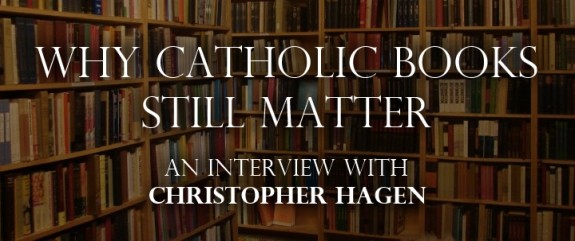
Christopher Hagen grew up in the home of a bible studying, church attending, Evangelical family in Nashville and later a Chicago suburb. He attended Carleton College in Minnesota because “the winters are harder there” and graduated in 1998 with a liberal arts degree in Religion and a beautiful Minnesota bride. A year after college, he and his wife were received into the Catholic Church.
 In 2001, after landing work at the largest theological bookstore in the world, Loome Theological Booksellers, he moved to Stillwater, MN where his family and education in Catholic bookishness steadily grew. Seven years later Christopher bought Loome Theological Booksellers with a partner, saw the birth of his fourth child, completed graduate work in Ave Maria University’s Institute for Pastoral Theology Program, moved to a larger home, and survived a month long siege of the whooping cough on his family. (It was a memorable year.)
In 2001, after landing work at the largest theological bookstore in the world, Loome Theological Booksellers, he moved to Stillwater, MN where his family and education in Catholic bookishness steadily grew. Seven years later Christopher bought Loome Theological Booksellers with a partner, saw the birth of his fourth child, completed graduate work in Ave Maria University’s Institute for Pastoral Theology Program, moved to a larger home, and survived a month long siege of the whooping cough on his family. (It was a memorable year.)
Today, Christopher works as an experienced bookseller at Loome’s and a neophyte farmer at Claret Farm where his family and the bookstore moved to in 2012.
He recently sat down with me to discuss the history of his massive bookstore, reading in the digital age, and why Catholic books still matter.
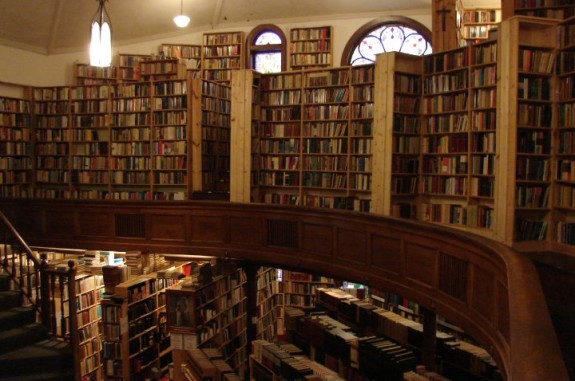
Brandon Vogt: How did Loome Theological Booksellers get started and what’s its mission today?
Christopher Hagen: Thomas Loome, DTh, opened what would become Loome Theological Booksellers in a 100 year old abandoned church building in Stillwater MN in 1983. While doing his graduate studies in Europe during the early 1970s he began selling used books on the side. His passion for books continued to grow until he transitioned out of teaching college theology into full-time bookselling after marrying and starting a family in the early 1980s.
From the beginning the mission of Loome Theological Booksellers has been to keep the Church’s intellectual circulatory system alive. The post Council upheavals tossed thousands of books out of libraries and onto the street. Loome traveled the highways and byways rescuing these books, the spiritual and intellectual heritage of the Church, and made them available for renewed study and collecting. For an acerbic critique and intellectual history of this period see Dr. Loome’s account of the dissolution of Catholic libraries.
Presently, although the number of closing Catholic libraries has diminished, Loome still seeks out and acquires books from all over North America and (occasionally) Europe. The bookstore recently moved out of the 100 year old church building and relocated to Claret Farm, also in Stillwater, MN. Claret Farm offers a more monastic, ora et labora, lifestyle for the bookstore and has more space and a flatter layout for ease of fulfilling mail orders and browsing for our elderly patrons. The new location is still an open shop and attracts bibliophiles like bees to honey (there is a hive on the farm too). During any given week the bookstore might host professors from local universities, mendicant religious (where do they get the money to buy books?), priests on vacation from the South, Chesterton devotees (who are always laughing), and even a Cardinal from the Vatican. Dr. Loome, retired since 2008, built a bookstore worth visiting and it’s still going strong.
Brandon: What are the some of the most exceptional books and volumes you’ve seen at Loome’s?
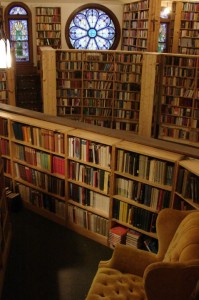
The other collection of books I remember fondly is a selection of books from the working library of J.R.R. Tolkien. There were about 40 titles, most of them with his signature and a number of them with copious annotations. Of course most of them were books of philological interest. I still have one copy from that collection in my office, a Sanskrit Grammar with a rare early version of his signature.
Brandon: Few parishes today boast any sort of Catholic library. Over the last few decades, we’ve seen thousands of Catholic schools, monasteries, convents, and seminaries close down, and with them large theological libraries. The founder of your bookstore, Thomas Loome, estimates that since the 1960s, Catholic colleges alone have disbanded “four to five million volumes.” Why is this literary decline so significant?
Christopher: What do so many people do when they walk into a room full of books? They get closer to the books. They scan the shelves reading titles on the spines. They soon find themselves pulling volumes off the shelves and looking at the table of contents or reading a page or two. When parishes, schools, seminaries, etc., have fewer and smaller rooms of books then people don’t interact with books and are impoverished for it.
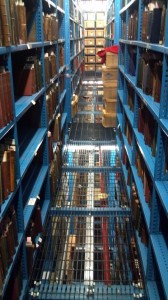
Lastly, a room full of books inevitably leads to unexpected delightful discoveries. Every room of books has titles he didn’t know about and would never have found except that it is THERE in front of him now. So there are varied and powerful ways that a room full of books impacts persons for the better.
Screen reading has the advantage of portability and affordability but is much more isolating and myopic than a room full of books. Rooms full of books tend to produce greater intellectual and spiritual fruit than a Kindle. God save the rooms full of books and give us “more bookish Catholics” as Thomas Loome was fond of saying.
Brandon: On that note, e-reading is on the rise today thanks to blogs and Kindles and iPads. In this increasingly digital world, why should people still read paper books?
Christopher: I already addressed above the great advantage of a room full of books over screen reading. Now, what makes reading an individual paper book different from reading a screen book?
Reading a paper book gives you a fuller physical interaction with the book which helps you to learn and retain more from the book and also makes it your own in a way that screen reading can never do. Every paper book you read gets into you and you get into it. The oils from your hands sink into the pages. The smell of your office embeds between the pages (especially if you smoke pipes there!). The food you were eating while reading sometimes sticks to the pages. Your highlighter, pencil, and pen leave traces of your reactions to the words. Often you even put your name in the book and might even print bookplates to do so. Every paper book, even if there are thousands of copies printed, becomes YOUR book because YOU left part of yourself in it. This hands on holding and page turning of the book gives a personal investment in the book which helps with learning and knowledge retention. (See this article for more: Do E-Books Make It Harder to Remember What You Just Read?).
Screen reading can never duplicate the fuller physical interaction that comes with a paper book. Your electronic copy of the text is identical to every other readers’ copy. You can’t make that electronic text your own. You can’t leave your mark on it. The screen text has a lifelessness to it. The paper text lives through your interaction with it. We read better from paper.
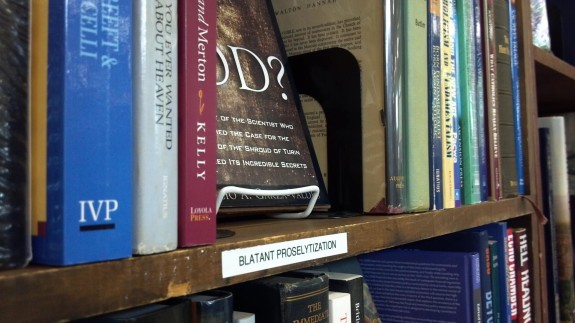
Brandon: The Catechism states that Christianity is not “a religion of the book,” referring to sola Scriptura. Yet at the same time Catholics root themselves in a rich literary tradition. What role do books play within the Church?
Christopher: The Magisterium of the Church lives, in a real way, by the Holy Spirit working through books. The Magisterium knows and interprets Sacred Tradition primarily through books. We primarily have access to the lived faith of Christians from the past through books. There is no oral tradition anymore in the Church. The Church needs books to access Sacred Tradition.
Just imagine how the Church would be if all the books disappeared but the Bible. Where would her memory be? Augustine—gone. Aquinas—gone. Catechism—gone. Documents and decrees of church councils—gone. Gone. Gone. Gone. You can see that the Holy Spirit really does aid and guide the Magisterium through books. Books are essential to the living reality of the Church.
Brandon: Catholic friends often ask me, “What should I read next?” What criteria do you suggest to people looking for their next Catholic read?
Christopher: If you have reading Catholic parents, ask them to recommend good books. Then actually read them and talk about them with your parents. This is probably a good thing to do even if they’re not Catholic.
Ask a mentor, pastor, or professor for a recommendation. I’m a big fan of personal recommendations because (1) the recommender knows me and can recommend a book especially for me and (2) it strengthens my friendship with him through mutual love of good books.
We have a long standing reading group at our parish called “The Misfits”. Last year they published a list of all the books they’ve read so far. You can find the list here, which contains many rewarding and challenging books for Catholics.
Lastly, Amazon does a great job with their “Customers who bought this item also bought” lists. Just look up a Catholic book that really helped you or that you really loved and you’ll find other similar worthwhile books.
Brandon: Outside of the Bible and magisterial texts, what five books have most deeply shaped your faith?
Christopher: Under the Mercy by Sheldon Vanauken – The sequel to the much better book, A Severe Mercy. However, Under the Mercy is the book by which I received light to believe that the Catholic Church is the one, holy, Catholic, and apostolic Church. My wife recommended it to me and she joined the Church with me the year after we read it.
Fire Within: St. Teresa of Avila, St. John of the Cross, and the Gospel on Prayer by Fr. Thomas Dubay – This book opened my mind to contemplative and ecstatic vistas I never knew existed as an Evangelical. It also was a kick in the pants to shed some adolescent possessions and appetites.
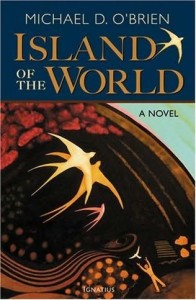 Medical Miracles. Doctors, Saints, and Healing in the Modern World by Jacalyn Duffin – The intercession of the Saints blossomed in my life after reading this book.
Medical Miracles. Doctors, Saints, and Healing in the Modern World by Jacalyn Duffin – The intercession of the Saints blossomed in my life after reading this book.
Mystic and Man of Action: Saint Anthony Mary Claret by Juan Lozano, C.M.F. – We named our farm after St. Anthony Claret, at the suggestion of my wife, before I knew hardly anything about him. I have deep yearnings for contemplative prayer and yet I have a boisterous family and an all-consuming business and farm. Reading about how St. Anthony Claret could be both a mystic and a man of action had direct effects on my spiritual life.
The Island of the World by Michael O’Brien – The best book I’ve ever read (and I know several others with the same assessment). It’s a novel about a Croatian man, from his childhood through old age, as he suffers through political oppression, lost love, and spiritual victory. I was profoundly moved by this book to live my life the best I can and to always look for Christ in the little ones.
Be sure to visit Loome’s at their official website, LoomeBooks.com. You’ll also find them on Facebook.
If you liked this discussion you’ll find several more on my Interviews page. Subscribe free via feed reader or email and ensure sure you don’t miss future interviews.

